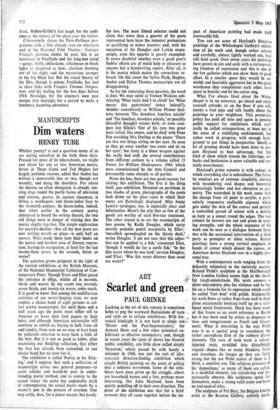Dim waters
MANUSCRIPTS HENRY TUBE
Whither poetry? is not a question many of us are asking ourselves in the bath these days. Pressed for news of its whereabouts, we might cast about for one or two American names, throw in Thom Gunn and Ted Hughes for largely patriotic reasons, admit that Auden has Written a memorable line or two, though not recently, and shrug the shoulders. For where the theatre, so often obsequied, is already run- ning rings round the portly forms of television and cinema, poetry, its ancient classmate, is lifting a woebegone and doom-laden face to the twentieth century. So doom-laden, indeed, that when earlier in the century poetry attempted to board the serious theatre, the two old things were in danger of sinking into the murky depths together. The simple explanation for poetry's decline—that all the best poets are now writing novels or plays—is only half an answer. What made them turn their backs on the purest and hardest area of literary expres- sion, leaving its occupation, at least for the last twenty-three years, to the seconds, thirds or worse?
The question grows poignant in the light of the current exhibition, at the British Museum, of the National Manuscript Collection of Con- temporary Poets. Though Yeats and Eliot guard the entrance in effigy, within all is seconds, thirds and worse; by my count two seconds, seven thirds, and twenty-six worse, sane much. It is good to know that among the multifarious activities of our never-sleeping state, we now employ a choice band of eight persons to col- lect poetry manuscripts; for until three and a half years ago the poets must either sell to America or leave their foul papers tQ their heirs, and although American universities will continue to outbid us, buying in bulk from all and sundry, from now on we may at least hope by judicious selection to keep back a little of the best. But it is not so good to know, after examining our fledgling collection, that either the best has already been ransacked, or our choice band has no nose for it.
The exhibition is called 'Poetry in the Mak- ing,' and I suppose that such a collection of manuscripts serves two general purposes—to assist scholar and would-be poet in under- standing poetic method, and to convey to the casual visitor the naive but undeniable thrill of contemplating the actual marks made by a master's pen in the process of creation. One may settle, then, for a minor master, but hardly for less. The most liberal selector could not claim that more than a quarter of the poets represented here have the remotest pretensions to qualifying as minor masters; and, with the exception of the Douglas and Larkin manu- scripts, even this quarter is poorly exampled. It seems doubtful whether even a good poet's feebler efforts are of much help or pleasure to anyone but a handwriting expert. After all, it is the poetry which makes the corrections re- levant. On this count the Sylvia Plath, Hughes, Auden and Dylan Thomas manuscripts are all disappointing.
As for the remaining three quarters, the word is dust. We may smile at Vernon Watkins sub- stituting 'What stairs had I to climb' for 'What means this pantomime' (what indeed?); shudder convulsively as William Plomer hesi- tates between 'The dowdiest, loneliest suicide' and The loneliest, dowdiest suicide,' or possibly (dreadful thought) retains both; or even com- pare Jon Silkin's 'Out of his eyes two great tears rolled, like stones, and he died' with Peter Pan watching Mrs Darling at the piano: 'There are two wet things sitting on her eyes. As soon as they go away another two come and sit on her eyes'; but irony is a blunt weapon against the really bad stuff, the several contributions from different authors to a volume called 15 Poems for William Shakespeare, 1964, which were commissioned by the Arts Council and presumably came cheaply to all parties.
None the less, there are two good reasons for visiting this exhibition. The first is the thing itself, qua exhibition. Mounted on partitions in two shades of green, photographs of the poets look down on the glass cases in which their wares are flatteringly displayed. Miss Jenny Lewis's catalogue, too, is especially clear and informative. More's the pity that so few of the goods are worthy of such five-star treatment. The other reason is to see the manuscripts of two poems by Keith Douglas, which carry sweetly pedantic pencil marginalia by Eliot: 'swordfish spreadeagled on the thirsty deck,' writes Douglas. 'I am not sure that this adjec- tive can be applied to a fish,' comments Eliot, 'though it would do for a cuttle fish.' In the dim water where he was lord,' persists Douglas; and Eliot: Was this water dimmer than most sea water?'


































 Previous page
Previous page